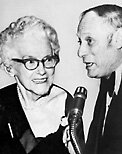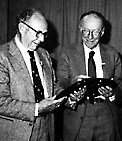



History of the Academy
In March of 1963, the Academy of Applied Science was chartered as a nonprofit, tax-exempt, scientific and educational corporation under the laws of the Commonwealth of Massachusetts.
Its founders, under the leadership of Robert H. Rines, President of the Academy, were concerned with the modern problems of technological innovation, its impact on society, and the plight of the inventor, researcher and entrepreneur in the innovative process. Aspects of the latter included inadequate recognition, less than competent legal and other societal regulation, and inadequate protection under patent and related laws. Interest in applied science, in general, and the nurturing of the climate for the risks of innovation balanced with the public interest were not keeping up with the needs of the country.
 |
 |
 |
 |
|
Robert Rines pays tribute to Elizabeth Rice O'Keefe, the first female member of the Academy. |
The Francis W. Davis workshop as it appeared about 1950. Mr. Davis (right) is with his assistant George W. Jessup, collaborator in developing power steering. |
November 12, 1981. Academy presents Medals of Honor to Harold E. Edgerton, MIT Institute Professor Emeritus (left) and Kenneth J. Germeshausen, Chairman of the Board, EG&G, Inc. (Retired), for their many inventive contributions and for their long time membership and support of the Academy of Applied Science. |
Academy Dolphin Tests in Florida. |
Activities
The Academy launched several conferences for the achievement of its goals. One of the most successful, the Interdisciplinary Conferences, are periodic gatherings of authorities from varied disciplines to exchange information and debate issues of concern to the Academy and the nation.
The Awards Programs have been a basis of the Academy's objective to recognize innovative talent. Singled out and honored with the Academy Medal of Honor have been several great inventors, entrepreneurs, and organizations that have brought forth remarkable innovations ranging from electronics to power steering and cryosurgery.
Lecture Programs have been provided to communities, educational institutions, and science museums. Research has been encouraged by the Academy and its members in several areas. Publications include reports on Academy conferences, monographs and articles on research, books, and films. Museum Support is another method the Academy uses to stimulate interest.
The Junior Science and Humanities Symposia and the Research and Engineering Apprenticeship Program are efforts to stimulate science-oriented high-school youth to pursue careers in science and engineering.
In 1973, the Academy was one of the sponsors of a new law center and school in Concord, NH. The Franklin Pierce Law Center is fully accredited by the American Bar Association.
The work of President Roosevelt's National Inventors Council - to function as a liaison between inventors and government agencies - continues through the sponsorship of the Academy and today enjoys a much broader charter.
Davis Workshop Donated To Museum Of Transportation
A part of the Academy's inheritance from the estate of Francis Wright Davis was his personal workshop used to make the first models of his original Power Steering Unit and other inventions. The shop was donated by the Academy to the Museum of Transportation in Boston, where it will be set up as a working shop, displaying the perfect one-man shop of yesterday's tinkerer.